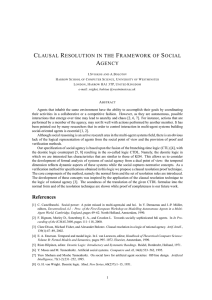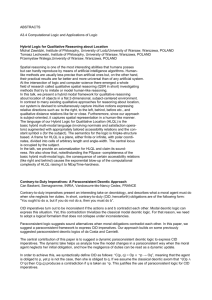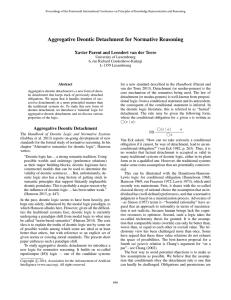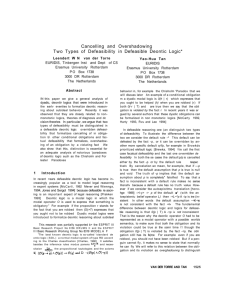ticsbullercheaterproof - Center for Evolutionary Psychology
advertisement
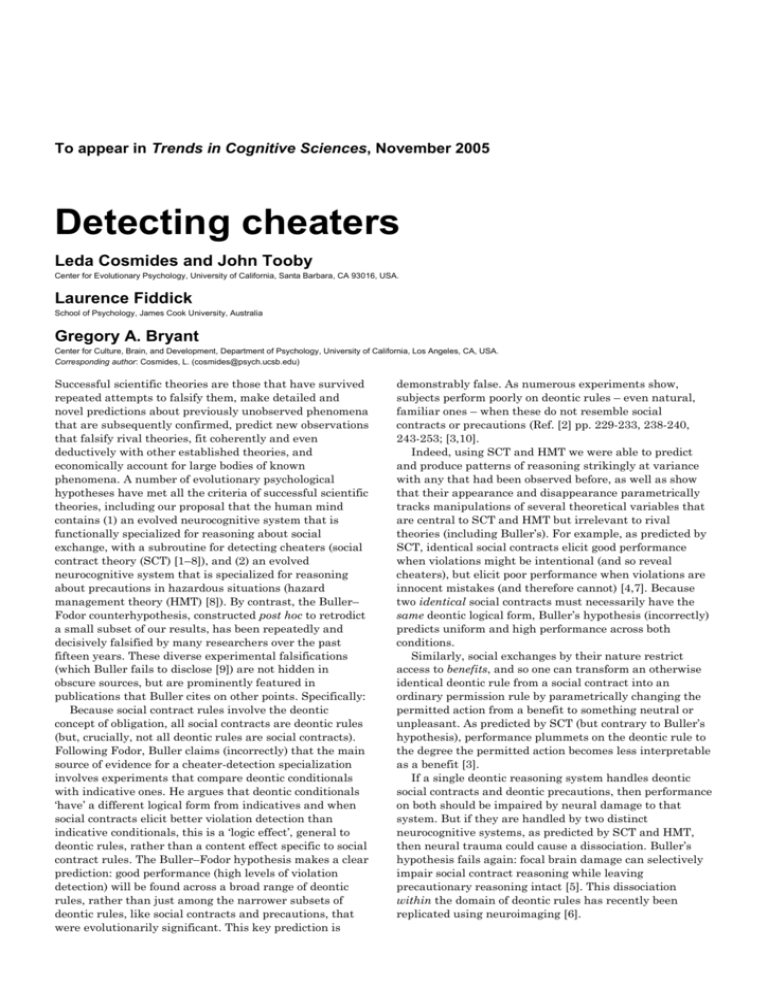
To appear in Trends in Cognitive Sciences, November 2005 Detecting cheaters Leda Cosmides and John Tooby Center for Evolutionary Psychology, University of California, Santa Barbara, CA 93016, USA. Laurence Fiddick School of Psychology, James Cook University, Australia Gregory A. Bryant Center for Culture, Brain, and Development, Department of Psychology, University of California, Los Angeles, CA, USA. Corresponding author: Cosmides, L. (cosmides@psych.ucsb.edu) Successful scientific theories are those that have survived repeated attempts to falsify them, make detailed and novel predictions about previously unobserved phenomena that are subsequently confirmed, predict new observations that falsify rival theories, fit coherently and even deductively with other established theories, and economically account for large bodies of known phenomena. A number of evolutionary psychological hypotheses have met all the criteria of successful scientific theories, including our proposal that the human mind contains (1) an evolved neurocognitive system that is functionally specialized for reasoning about social exchange, with a subroutine for detecting cheaters (social contract theory (SCT) [1–8]), and (2) an evolved neurocognitive system that is specialized for reasoning about precautions in hazardous situations (hazard management theory (HMT) [8]). By contrast, the Buller– Fodor counterhypothesis, constructed post hoc to retrodict a small subset of our results, has been repeatedly and decisively falsified by many researchers over the past fifteen years. These diverse experimental falsifications (which Buller fails to disclose [9]) are not hidden in obscure sources, but are prominently featured in publications that Buller cites on other points. Specifically: Because social contract rules involve the deontic concept of obligation, all social contracts are deontic rules (but, crucially, not all deontic rules are social contracts). Following Fodor, Buller claims (incorrectly) that the main source of evidence for a cheater-detection specialization involves experiments that compare deontic conditionals with indicative ones. He argues that deontic conditionals ‘have’ a different logical form from indicatives and when social contracts elicit better violation detection than indicative conditionals, this is a ‘logic effect’, general to deontic rules, rather than a content effect specific to social contract rules. The Buller–Fodor hypothesis makes a clear prediction: good performance (high levels of violation detection) will be found across a broad range of deontic rules, rather than just among the narrower subsets of deontic rules, like social contracts and precautions, that were evolutionarily significant. This key prediction is demonstrably false. As numerous experiments show, subjects perform poorly on deontic rules – even natural, familiar ones – when these do not resemble social contracts or precautions (Ref. [2] pp. 229-233, 238-240, 243-253; [3,10]. Indeed, using SCT and HMT we were able to predict and produce patterns of reasoning strikingly at variance with any that had been observed before, as well as show that their appearance and disappearance parametrically tracks manipulations of several theoretical variables that are central to SCT and HMT but irrelevant to rival theories (including Buller’s). For example, as predicted by SCT, identical social contracts elicit good performance when violations might be intentional (and so reveal cheaters), but elicit poor performance when violations are innocent mistakes (and therefore cannot) [4,7]. Because two identical social contracts must necessarily have the same deontic logical form, Buller’s hypothesis (incorrectly) predicts uniform and high performance across both conditions. Similarly, social exchanges by their nature restrict access to benefits, and so one can transform an otherwise identical deontic rule from a social contract into an ordinary permission rule by parametrically changing the permitted action from a benefit to something neutral or unpleasant. As predicted by SCT (but contrary to Buller’s hypothesis), performance plummets on the deontic rule to the degree the permitted action becomes less interpretable as a benefit [3]. If a single deontic reasoning system handles deontic social contracts and deontic precautions, then performance on both should be impaired by neural damage to that system. But if they are handled by two distinct neurocognitive systems, as predicted by SCT and HMT, then neural trauma could cause a dissociation. Buller’s hypothesis fails again: focal brain damage can selectively impair social contract reasoning while leaving precautionary reasoning intact [5]. This dissociation within the domain of deontic rules has recently been replicated using neuroimaging [6]. Interpretations of social contract rules track SCT’s domain-specialized inference procedures: in [8], we refuted Buller-style logic explanations of social contract results for perspective change, switched rules, and ‘wants’ problems – facts he fails to mention, let alone discuss. Buller’s systematic inattention to large bodies of findings that conflict with his assertions is not due to lack of space in TICS – the pretence that these findings do not exist pervades his book, and its treatment of many areas of evolutionary psychology. (For further analysis, see www.psych.ucsb.edu/research/cep/buller.htm) References 1 Cosmides, L. and Tooby, J. (2005) Neurocognitive adaptations designed for social exchange. In Evolutionary Psychology Handbook (Buss, D.M., ed.), pp. xx–xx, Wiley 2 Cosmides, L. (1989) The logic of social exchange: has natural selection shaped how humans reason? Studies with the Wason selection task. Cognition 31, 187–276 3 Cosmides, L. and Tooby, J. (1992) Cognitive adaptations for social exchange. In The Adapted Mind: Evolutionary Psychology and the Generation of Culture (Barkow, J., Cosmides, L. and Tooby, J., eds), pp. xx–xx, Oxford University Press 4 Cosmides, L. and Tooby, J. (2000) The cognitive neuroscience of social reasoning. In The New Cognitive Neurosciences (2nd Edn) (Gazzaniga, M.S., ed.), pp. 1259–1270, MIT Press 5 Stone, V. et al. (2002) Selective impairment of reasoning about social exchange in a patient with bilateral limbic system damage. Proc. Natl. Acad. Sci. U. S. A. 99, 11531–11536 6 Fiddick, L., Spampinato, M.V. and Grafman, J. Social contracts and precautions activate different neurological systems: an fMRI investigation of deontic reasoning. NeuroImage (in press) 7 Fiddick, L. (2004) Domains of deontic reasoning: resolving the discrepancy between the cognitive and moral reasoning literatures. Q. J. Exp. Psychol. 57A, 447–474 8 Fiddick, L., Cosmides, L. and Tooby, J. (2000) No interpretation without representation: the role of domain-specific representations and inferences in the Wason selection task. Cognition 77, 1–79 9 Buller, D.J. (2005) Evolutionary psychology: the emperor’s new paradigm. Trends Cogn. Sci. 9, 277–283 10 Manktelow, K. and Over, D. (1990) Deontic thought and the selection task. In Lines of Thought: Reflections of the Psychology of Thinking (Gilhooly, K. et al., eds), pp. 153–164, Wiley
